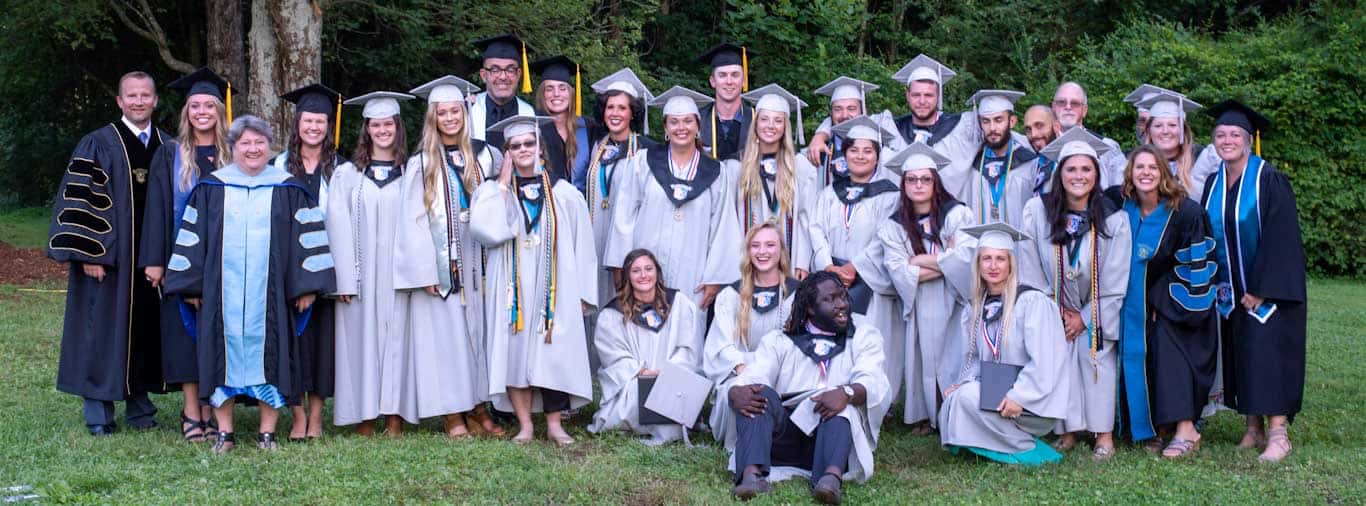Frequently Asked Questions

Jump to the relevant section of our FAQ using these links:
_
_
_
Post-Graduation & Career Opportunities
_
Our School & Facilities
Where are your programs held?
We have three campuses to provide our dog trainer students with top-class facilities.
Our Main Campus is located at:
162 Early Lane
Harmony, NC, 28634.
Our Southeast Campus is located at:
4339 County Rd 216
Hanceville, AL, 35077
Our Hill Country Campus is located at:
365 T Bird Lane
Utopia, TX 78884
For more information on our dog trainer school locations, click here.
Is Your School Licensed?
Yes. Our School for Dog Trainers is licensed by the North Carolina State Board of Community Colleges. The North Carolina State Board of Community Colleges is not an accrediting agency. Our School is also licensed by the Private School Licensure of the Alabama Community College System. The School for Dog Trainers is also approved and regulated by the Texas Workforce Commission.
What are the schedule/hours for the school?
Programs are held Monday through Friday from 8a-5p. Students are expected to arrive on-time for class, however some tardiness and absences are excused. Students are allowed to miss an average of 0.5 days per week.
Do you offer housing options?
Students have several housing options available for their studies at the School for Dog Trainers. Housing availability varies by campus location.
At our Main Campus and Southeast Campus locations, short-term accommodation is available nearby through Farmhouse Property Management, LLC. Housing includes wireless internet, full kitchens as well as laundry facilities as part of the housing package. Students are allowed to house up to two of their personal dogs with them in their bedroom. In addition, there are several RV parks located nearby for students who have their own RV.
At our Hill Country Campus, prospective students should reach out to our Training Director, Kim Cain, for more details on housing arrangements. Kim can be reached at kim@highlandcanine.com.
Are students required to attend class on the weekends?
No. We often have expos, clinics, seminars, classes and other events on the weekends that students are welcomed to attend if they wish. However, students are not required to attend any classes or events on Saturdays or Sundays.
Are students required to clean kennels or participate in a “work detail program”?
No. We have a full-time staff of kennel assistants that manage the care and cleaning of our kennels. Students are responsible for caring for and cleaning up after their own personal dogs, but are not required to clean other kennels.
Can students bring their own dog with them to school?
Yes, you are allowed to bring up to two (2) dogs with you to the Main Campus and Southeast Campus. Students can bring one (1) dog to the Hill Country Campus. Unfortunately, cats, fish and other types of pets are not allowed.
Can students use their own dog during classes/practicals/assignments?
Whilst students can bring up to two dogs with them to the program, they will not be permitted to use their own dogs for tests and/or practical assignments. Students will have the opportunity to work with a variety of other dogs and breeds during the program to ensure that you have the necessary experience to become a well-rounded trainer.
Do students need to get a dog before attending class?
No. We consistently have a variety of dogs available for our students during the program. As part of our Second Chance Program, we commonly take in dogs from local shelter and rescue groups for training and rehabilitation during our schools.
Am I required to purchase books for the class?
No. We provide all the books and materials that you need for the program. Books are available for checkout for use during the program and are required to be returned. You are welcome to purchase your own books if you would like but you are not required to do so.
Our Dog Trainer Programs
How are the programs structured? What percentage of the class is hands-on versus lecture and classroom time?
Our programs include lecture, classroom discussion, reading, videos as well as hands-on application of the techniques taught in class. Approximately 65% of our program encompasses the practical hands-on application of the techniques taught. Approximately 35% of the program covers lectures, and classroom activities. A majority of the classroom phase is conducted during the first several weeks of class.
How many students typically attend a program?
Our programs at the School for Dog Trainers are designed to provide a good student-to-instructor ratio which allows for ample one-on-one instruction and feedback. Class sizes will vary depending on the program and campus, but typically, our Master Dog Trainer program has between 28-30 students enrolled in one class; all other programs may have anywhere from 5 to 15 students enrolled. For more information on class sizes, please contact us.
Who are the instructors for the program?
In an effort to provide the best possible instruction, we utilize a variety of instructors that have extensive “real life” application experience in the particular subject area being taught. Our instructors have years of experience in the dog training industry and have a proven track record of developing successful graduates of our school for dog trainers. Learn more about the staff of our School for Dog Trainers.
What is the difference between 6, 8 and 12 week courses?
We get this question quite often. Although the class lecture time on the basics of successful training is about the same, the 12 week program explores in greater detail the nuances and specialties within a given area. In addition, the actual “hands-on” experience is vastly different. The 8 and 12 week programs offer students the ability to work with a variety of dog breeds, sizes and temperaments. This teaches the very valuable lesson that just as no two people are alike, no two dogs respond exactly the same to the appropriate dog training techniques.
Do you teach the business side of dog training?
Absolutely! Just as being a successful dog trainer requires specific skills, knowing the key component to operating and growing a successful business are covered in our programs. From legal contracts and forms to website design, advertising and marketing, and even kennel management, we cover the business side of training dogs. In fact, we have had students leave the 12 week program with their business webpage up and running and their marketing materials printed and ready for dissemination. Our instructors are happy to assist and offer their expertise in this area.
What methods of training do you teach?
Our programs teach a variety of training methods to ensure that our graduates have all the necessary tools that are required to be successful as a professional dog trainer. From clicker training and the basics of positive reinforcement to properly using other tools in training, such as remote training collars and other training collars, our programs cover it all.
What makes our dog trainer programs better than others?
The School for Dog Trainers at Highland Canine Training offers the most comprehensive programs you will find anywhere. Our programs are systematically designed to provide you the information you need to be a dog trainer in a way that students can easily absorb and more importantly, apply it. Our programs also offer you the experience that you will need to be a successful dog trainer in the industry. Our instructors have years of experience in the canine instructional field but just as important, they also have the expertise of running successful dog training businesses and programs. As a student, you will be immersed into all aspects of the industry and have an opportunity to work with dogs and quickly learn how to best interact and teach dog owners/handlers. We invite you to book a school tour and visit with our instructors in order to see the difference for yourself.
Admissions & Financing
Do you accept international students?
Yes, we welcome students from all over the globe and have hosted students from across North America, South America, the Caribbean, Asia, Europe, Australia and Africa. If you are interested in attending our programs from outside the US, you can learn more here about International Dog Trainer Students.
Do you offer training for large groups for police and military organizations?
Yes, we have custom designed training for both national and international law enforcement and military groups and have hosted a number of trainer programs for large groups in the past.
Do you offer financial aid or accept VA benefits?
We offer simple and affordable financing options for our programs that are available to anyone living within the US and US territories. We are also approved to accept VA benefits for military veterans. For more information on certifying VA benefits or enrollment using either of these options, please contact us.
Post-Graduation & Career Opportunities
Can I make a living as a professional dog trainer?
Yes! Published research (asking hundreds of dog trainers from across the United States) demonstrates that dog training is a viable career option. On average, full-time dog trainers can earn in excess of $60,000; gaining a dog training certification increases earning potential by around 40%.
Becoming a professional dog trainer can be a satisfying and fulfilling career. Highland Canine Training’s School for Dog Trainers will give you the assistance you need to expand your possibilities as a professional dog trainer and make your dog training business a success. Whether your goal is to offer professional training from your home or to operate and manage a full-scale boarding and dog training facility, we will provide you with the skills and experience to make you successful!
Do you offer job placement help?
Our staff at the School for Dog Trainers will assist you in your search for a job as a dog trainer, however we cannot guarantee job placement after completing a program. We often hire a number of our top graduates to work for us as contractors in our own dog training business.
Do you offer internships or apprenticeships?
Yes. We often offer internship positions to students who have successfully graduated from one of our 12, 18 or 24 week programs and have finished top in their class. Prior to the conclusion of our programs our instructors approach students to discuss internships and future career opportunities.
